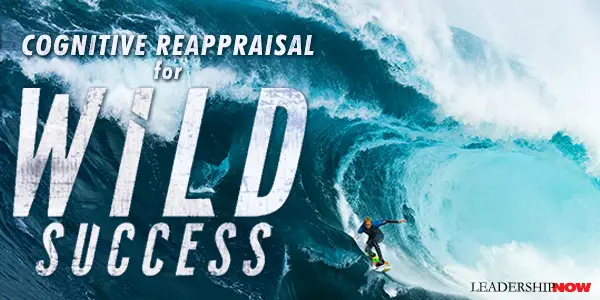 |
 |
04.27.20

Cognitive Reappraisal for Wild Success
EXTREME adventurers have to perform at their best every time, or there might not be another time. They must be able to execute a plan under pressure. The same qualities that help them succeed will help any leader perform at a higher level and especially in a crisis situation. Wild Success by Amy Posey and Kevin Vallely illustrates seven leadership lessons we can learn from the harrowing experiences of extreme athletes. They are cognitive reappraisal, grit, learning from feedback, finding your spark, innovation, resilience, and building balance. I want to focus on a critical, but often difficult skill that we all need to develop: cognitive reappraisal. When you are looking at danger, uncertainty, and understandable fear, you need to be able to get perspective on what you’re facing. And when things go wrong, this discipline is even more critical. Posey and Valley introduce the experience of one of the best big wave surfers in the world, Australian Mark Mathews. Before Mark faces a dangerous wave like the slab wave he’s about to ride, “he performs a set pre-surf ritual to put his mind into focus. It’s something he does every time. ‘Fear is a big part of what I do,’ he says, ‘so dealing with it effectively is critical to my performance.’ Using simple breathing techniques to slow his mind down, Mark concentrates on feelings of excitement rather than anxiety, while reflecting on why he is doing what he is doing.” But on this day in 2016, Mark attempts to escape the wave, but the wave picked him up and slammed him feet first into the reef. Rushed to the hospital, the doctors find that the force of the blow has dislocated his knee, fractured his chin, ruptured his anterior and posterior cruciate ligaments, and ripped through his artery and nerve. They doubt they can save his leg. But with some luck they do, and he is treated for three months in the hospital. It looks like his career is over. But it isn’t. His ambitions have only grown. “What allows Mark to have the mental wherewithal to claw back from catastrophic injury and still have the fortitude to remain committed to the very thing that has hurt him so badly?” Cognitive reappraisal. Cognitive reappraisal is our ability to consciously manage our emotional experiences and responses to a setback or challenge and transform the negative emotions we feel into more positive ones. Cognitive reappraisal lets us not only acknowledge and reduce our emotional response to a negative situation, but it also changes our perspective on that situation by letting us take a step back and add a positive spin to whatever challenge we’re facing. Building this ability takes practice. Every setback is an opportunity to develop this mindset until it becomes a habit. For Mark, his “ability to positively reframe a situation both on and off the waves has come with lots of practice, and this practice developed a habit of cognitive reappraisal that served him well when he needed it most.” A habit of reframing a negative situation actually rewires your brain. A study by Columbia University professor Kevin Ochsner and his team found that when those who reframed a negative situation in a positive light, “their prefrontal cortex, the area of the brain integral to one’s cognitive behavior and emotional self-regulation, was activated by their reframing of the situation, while their amygdala, the area of the brain associated with fear and anxiety, saw a reduction in activity.” Negative events happen to us all. It’s normal to have an adverse emotional reaction—anger, hurt, self-doubt—at first. But if you can recognize the emotion in the moment—the shallow breathing, sweaty palms, an upset stomach—and make a choice to put cognitive reappraisal into action, you will take much of the stress out of the situation and allow for your creativity and to take hold and move forward in a more emotionally intelligent way. If we miss these symptoms [of stress] at the early stage, we quickly move into something called the emotional “point of no return,” where your emotions become fully activated, and reappraisal becomes exceptionally difficult. Practicing this anticipatory regulation during small and low-stakes stressors allows you to understand your own point of no return and [be better able to pull yourself] back from it. Cognitive reappraisal is a simple idea but very difficult to put into practice in the heat of the moment. But with some intentional practice, you can make it a habit that will serve you well in stressful and negative situations. 
Posted by Michael McKinney at 07:07 AM
|
BUILD YOUR KNOWLEDGE
 

How to Do Your Start-Up Right STRAIGHT TALK FOR START-UPS 
Grow Your Leadership Skills NEW AND UPCOMING LEADERSHIP BOOKS 
Leadership Minute BITE-SIZE CONCEPTS YOU CAN CHEW ON 
Classic Leadership Books BOOKS TO READ BEFORE YOU LEAD |